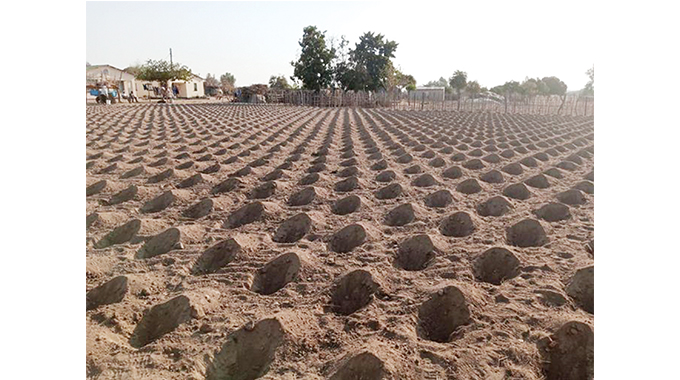
Mashudu Netsianda and Munyaradzi Musiiwa
Close to 300 000 farmers in Matabeleland South, Midlands and Matabeleland North provinces have undergone training for Gatshompo/Pfumvudza, a zero-tillage agricultural programme introduced by the Government to optimise grain production ahead of the summer cropping season.
The programme, which is still in its infancy, has been quickly embraced in rural communities mostly in Gokwe South and Kwekwe in the Midlands. The two districts have a combined 35 000 farmers who underwent the training.
In Matabeleland South, the programme is on course with a targeted number of least 100 450 farmers undergoing training. Almost as many farmers are on the programme in Matabeleland North.
The Government is advocating zero tillage seeding in areas that receive below average rains and semi-arid regions considering that it leaves plant residues on the ground, which can help keep the soil moist and protect against evaporation caused by sun and wind.
Some of the advantages of Gatshompo/Pfumvudza are that it improves soil structure considering that tilling land usually disrupts natural structures of soils as well as dispersing carbon needed by soils into the air.
This means more nutrients are preserved in the soil which also increases yield.
With zero tillage of Gatshompo/Pfumvudza erosion can also be reduced since it leaves more residue on the surface in the months when there are no crops growing like the dry season or winter.
This keeps the soils moist as well as intact. It is another way that this method improves soils nutrients

Ideally, each time equipment drives over the surface, soil gets compacted. This means the air and water pockets present in the soil are squeezed out by the weight of the machinery enabling the passage of water, crop roots and soil species.
Because no-till decreases the quantity of equipment used, the compaction hazard is lowered.
Addressing Zanu-PF Midlands Provincial Coordinating Committee, Midlands Provincial Affairs and Devolution Minister Larry Mavima said the province sought to double the number of trained farmers before the start of the impending summer cropping season.
“On the Pfumvudza programme, the province is undertaking comprehensive agriculture training to ensure food security at household level. A total of 92 954 farmers have been registered and trained to date. There was a high turnout in Gokwe South and Kwekwe who have 19 251 and 15 080 farmers trained respectively,” he said.
Minister Mavima said Gatshompo/Pfumvudza will help mitigate drought in the province which has food deficit of 34 099 tonnes.
He said there were more than 176 000 households in the province that were in in need of food aid.
“There is shortage of maize grain in all the districts in the province. Grain shortage is exacerbated by inadequacy as demand is higher than supplies which was also worsened by termination of the World Food Programme (WFP). Most districts did not receive anything this month. The province has a maize rain deficit of 34 099 tonnes,” he said.
Finance Minister Professor Mthuli Ncube attributed the food distribution interruptions to foreign currency shortage.
Matabeleland North is targeting to train at least 350 farmers per agricultural extension and technical services officer in the seven districts under the zero-tillage agricultural programme.
Matabeleland North Provincial Affairs Minister Richard Moyo said communal farmers are already preparing land for the zero tillage programme in the province.
He said the concept, which is aimed at climate proofing agriculture, is set to boost household food security and nutrition and also economic growth for the largely rural province.
“As I speak in all our seven administrative districts in the province, our agricultural extension officers are busy on the ground training farmers. We are targeting to train at least 350 farmers in the province per agricultural extension and technical services officer,” said Minister Moyo.
He however, could not give the exact number of Arex officers and the number of farmers benefiting in the province.
Minister Moyo said farmers will be able to be food self-sufficient with surplus contributing towards the strategic grain reserve.
In Matabeleland South, the Acting provincial agricultural extension and technical services officer, Mr Mkhulunyelwa Ndlovu said farmers are already working on their plots.
“We are targeting mostly communal famers and they should have at least three plots, one for producing enough for household and the excess you have to sell it for grain reserve. The other one is for commercial purposes and the component of nutrition is very critical and that is when we talk of legumes and pulses,” he said.
Mr Ndlovu said farmers were not limited to having three plots. He said zero tillage was more ideal in the province as it receives below average rainfall.
“The main idea is to maximise on production and address the issue the issue of climate change because our rainfall pattern is not properly defined but we are saying if a farmer plants early, they are set to get the required yields,” he said.
Mr Ndlovu said farmers have embraced zero tillage as a way of reducing costs of production as well as preserving soil moisture.
“Farmers should plant with the first rains when the grass starts to germinate and at the same time the crop, especially small grains, which we are dealing with, it will grow as long as the farmer has done all the necessary agronomical practices.”
